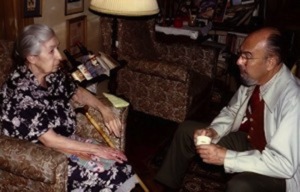A fascinating, erudite polyglot, Nicholas Milroy (1911-2000) saved the recorded and written legacy of his mother Etelka Freund (1879-1977), a pianist who was privately taught by Brahms, esteemed by Busoni, and an early friend and champion of Bartók. When the Baldwin Piano Company learned that their artist Bartók was ill, they requested he return the piano they gave him as one of their featured performers. Milroy learned about him being without an instrument and within twenty-four hours, a modest upright appeared at Bartók’s West 57th Street apartment. Milroy never mentioned this: it was Bartók’s son Peter who related it in his remarkable memoir “My Father”
Milroy was an intelligence officer for the U.S. Army during World War II and afterwards served as a diplomat in Morocco, Burundi and elsewhere. A paper of his “office work” came to light some time ago and is worth a glance.
<< LITERATURE OF THE HOLOCAUST Search for a (single) word: FILREIS HOME | NEWS ———————————————————————— U.S. report details close Swiss-German war ties —————————————————————— From: C-reuters@clari.net (Reuter / William Scally)
Subject: U.S. report details close Swiss-German war ties
Date: Tue, 17 Dec 1996 19:20:56 PST WASHINGTON (Reuter)
– An official U.S. report written after the second World War and made public Tuesday detailed economic and financial penetration of Switzerland by Nazi Germany that increased during the war years.
The report, newly unearthed in the U.S. National Archives, said gold deposits in Swiss banks doubled between 1939 and 1945, on gold looted by the Nazi regime.
It said Swiss industry was almost totally geared to the German war effort; Swiss banks were used for unfettered financial transactions by German financial interests, and Swiss railroads were “forced into the service of the German war economy.”
The 1945-46 report by State Department official Nicholas Milroy was released by Sen. Alfonse D’Amato, a New York Republican who has taken the lead in demanding that looted money in Swiss banks deposited by Jewish Holocaust victims be handed over to their families.
Amid pages of dry statistics, the report made these points:
* “Swiss industrial manpower, as well as her production facilities and products, were almost totally geared to the German demand.”
* “Swiss banks served as a safe haven for all kinds of deposits belonging to German firms and individuals … It is obvious that the tremendous amount of gold transferred by banks, firms and individuals to Switzerland could only result from looting.”
* Swiss machine factories were frequently paid twice or overpaid by German firms or clients so that new German-owned factories could be established under Swiss names or a credit balance created that could be used to deliver products years later.
In releasing the report, D’Amato said: “Switzerland was obviously not the neutral country they would wish the world to believe they were during the second World War.”
The report noted that German influence in Switzerland resulted from geographical and ethnic factors and Switzerland’s dependence on Germany for raw materials.
It showed that in 1939 Swiss imports from Germany totalled 440 million Swiss francs, or 23.31 percent of total imports. In 1942, at the height of the war, these imports rose to 660 million francs, or 32.22 percent.
In 1939 Swiss exports to Germany totaled 192 million francs, or 14.76 percent, growing to 656 million francs or 41.72 percent in 1942.
Swiss gold reserves totalled 2.374 billion Swiss francs in 1939. By March 1945 this these had risen to 4.672 billion, due almost entirely to German deposits, the report said.
It said the German government and business used Swiss professional secrecy laws to cloak their business interests around the world by creating a chain of holding companies in various neutral countries.
Although Swiss assets were blocked in the United States and Britain, Swiss banks operated freely in other countries ”allowing the financial transactions between the cloaks of various German interests to take place unhampered,” the report said.
It added: “Apart from these transactions aiding the German war economy and German interests in general, the Swiss banks served as a safe-haven for all kinds of deposits belonging to German firms and individuals”. —————————————– http://dept.english.upenn.edu/~afilreis/Holocaust/nazi-swiss-dealings.html
When we met in 1980, Milroy was reluctant to allow the radio broadcasts he recorded of his mother to be published, concerned about an intrusive announcer truncating one work, and some occasional wrong notes during the live broadcasts. For more than a year we collaborated weekly to translate the memoirs of Uncle Robert, Etelka’s older brother who had studied piano with Moscheles, Tausig, and Liszt. Brahms was in his hands when Freund and two other pals of the composer’s brought him to Italy on his 60th birthday. Freund taught in Zurich for many years and retired to Budapest where Bartók often visited with new compositions and wax cylinders he recorded in villages. A future entry on the Music Resource Center will contain our full translation of Robert Freund’s memoirs.
Milroy eventually allowed Etelka Freund’s performances to appear on CD: two works she learned from the composer are on our Brahms compilation.
To get an idea of his character, one may listen in to Milroy’s dark deep voice, one that graced Radio Free Europe’s Hungarian network during the Cold War, his sole appearance on New York radio to discuss his family’s musical life:


Alan, this is wonderful material, a part of history coming out of the shadows . Thank you for making it making it public now!
Styra Avins